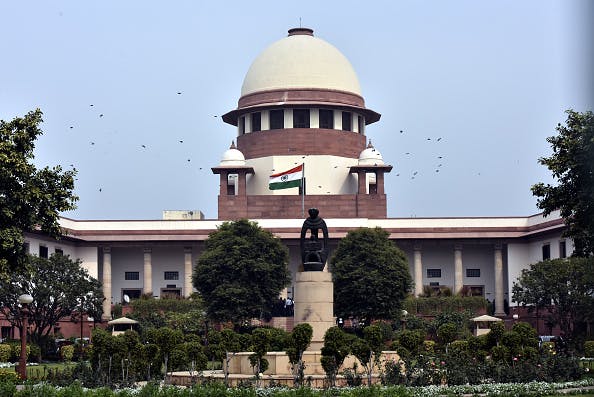Why India’s Supreme Court is the Last Recourse for Justice
Historically the greatest obstacle to rewriting the country’s constitution, the highest court today is being subverted by Modi’s government.
At 11:30 p.m. on February 25, the Delhi High Court received an urgent petition from a lawyer urging safe passage for people wounded in the riots raging in the city. Outlying areas of the Indian capital had been on fire for two days as mobs rampaged through neighborhoods, torching houses, vandalizing places of worship, hurling petrol bombs into homes, and slaughtering people for belonging to the wrong religion. The security machinery of the city had been busy protecting U.S. President Donald Trump, who had just departed Delhi after a 36-hour state visit to India. Videos of incendiary speeches by politicians from Prime Minister Narendra Modi’s Hindu-first Bharatiya Janata Party (BJP) were competing for attention online with footage of cops colluding with hordes of Hindu hooligans. There were courageous exceptions, but agents of the state openly abetted one community against the other. What was unfolding was the prelude to a full-blown anti-Muslim pogrom. Ambulances, halted by roadblocks, couldn’t carry the injured to hospitals. The powers-that-be, busy hosting a lavish banquet for Trump in the presidential palace as the city burned around them, appeared untroubled by the carnage.
So, as has often been the case with India in moments of total hopelessness, a young lawyer named Suroor Mander approached the judiciary and sought an urgent remedy. Indians demoralized by political dysfunction have come to regard the Supreme Court as the republic’s deus ex machina, its savior, and, like hypochondriacs who swallow antibiotics to fight off a common cold, have become habituated to petitioning the court to resolve matters that ought to be settled by the executive and the legislature. This dependency is profoundly unhealthy — but the poor health of India’s democracy has necessitated it.
Dr. S Muralidhar, the judge who received the young lawyer’s petition, decided to hold a hearing at his house at midnight. He and another judge gave instructions to the police to clear the way immediately for ambulances. The next day, Muralidhar reproached the government and the police for failing to protect civilians and demanded an explanation within 24 hours; he was also furious that the police had not seen the clip of BJP politician Kapil Mishra’s incendiary speech that allegedly lit the fire for the pogrom and played the clip in court. To a country that was becoming gradually accustomed to judicial timidity ever since Modi was lofted into the prime minister’s office in 2014 — one Supreme Court justice last year proclaimed the prime minister a “hero” and a “model” — Muralidhar’s righteous outrage felt like a roar of conscience. The government could not abide it and transferred the judge to Punjab that very night. His successors in the Delhi High Court ignored his deadline. The banishment of Muralidhar vivified the collapse of one of India’s most vital institutions — the courts — under the authoritarian weight of the Modi government.
